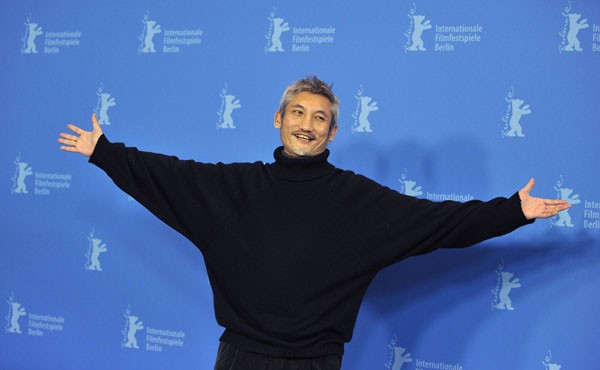It has haunted him for 40 years, says Hong Kong filmmaker and actor Tsui Hark of his latest movie entitled "The Taking of Tiger Mountain."
The new 3D film, which is set to be released on Christmas eve, garnered applause from fans and critics for its amazing visual effects and action-packed plotlines during the advanced screening. Theater managers hail the movie as a kind of savior after the box-office failure of "Gone with the Bullets" by filmmaker Jiang Wen, which was both a commercial and critical failure.
"I don't worry about whether the young generation will accept and like the movie," Tsui Hark said, "making this movie is a wish that has haunted me for 40 years. I just ask myself to make a good film and share it with all of you."
Produced by Bona Film Group, the movie is an adaptation of the bestselling novel "Tracks in the Snowy Forest" by Qu Bo. It is about communist spy Yang Zirong and how he uses his skills and wit to defeat his enemies. The movie was set in the war years of 1940s.
However, Tsui's film is not the first adaptation of Qu's book. It was previously adapted into a Peking opera by Shanghai Jingju Company, making it into a classic revolutionary film titled "Taking Tiger Mountain by Strategy" and inspiring one other film in 1970, and three musical dramas in the late '60s.
According to Tsui, the Peking opera was what inspired him to make his own adaptation when he saw it 40 years ago while doing community service in New York's Chinatown.
Tsui said: "If I ever have a chance in the future to do anything related to films, I will turn this story into a new movie." This memory of the experience inspired him to put a New York scene in his own adaptation. Tsui added that after reading "Tracks in the Snowy Forest" in the '70s, he knew that the story was still relevant.
In 1992, during a gathering of Hong Kong and Chinese filmmakers, Tsui was asked by director Xie Jin what kind of movie he wanted to shoot and without hesitation, he answered "Taking Tiger Mountain by Strategy." Said conversation was overheard by then Kung Fu star Jackie Chan, who immediately volunteered for the lead part.
Eventually, the leading role went to Chinese actor Zhang Hanyu, while the role of the villain went to veteran Hong Kong actor Tony Leung. Bona Film Group purchased adaptation rights in 2009, and three years later, cameras started rolling.
To remain true to the novel, Tsui visited Qu's widow Liu Bo to swap stories about her late husband's military exploits and the real people behind Qu's characters.
Producer Huang Jianxin said that the whole production crew experienced hardship during the shoot. They went to north China to film snowy scenes, staying for two months in freezing temperatures. At some point, the hotel where they stayed during the production was hit by a snow storm, cutting off electrical lines, and thus, cutting off heating, water and even cell phone signals. Huang also admitted that he was worried at first about the movie's box office outcome, but upon seeing the final cut, all his worries were put to rest.
He also offered statistics showing that Chinese people are very familiar with the story: "It was reported that when the novel was adapted into the model Peking opera in the '60s, the opera was viewed by 370 million people. If you multiply the 30 yuan ticket price by that number of viewers, can you get a hint of the box office results now!"



























